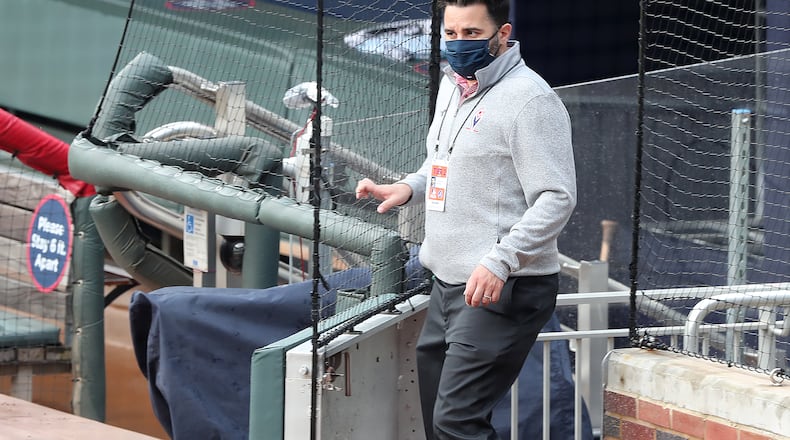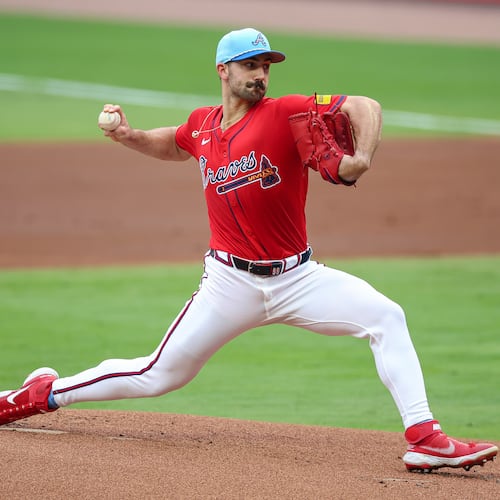The Braves lost their best pitcher Monday night, and because of the ever-changing and uncertain circumstances surrounding the season, it’s going to be difficult for them to acquire external help.
When Mike Soroka tore his right Achilles tendon during his start against the Mets, the Braves’ odds at their first pennant this millennium felt like they went out with him. For two weeks, it already seemed like the rotation was being loosely held together by adhesive tape.
Soroka, who is expected to undergo surgery within the next week, and Max Fried were the only known quantities in the team’s starting five. Now, the Braves are crossing their fingers four of every five days, which is not a place any World Series hopeful should be.
“We’re determined to win as many games as we can and win the World Series,” general manager Alex Anthopoulos said. “Mike Soroka certainly helps those chances a lot. It’s a huge loss, there’s no way to understate that. But at the end of the day, we still have a lot of great players. We’re going to continue to grind and try to make the team better.”
While unsurprisingly expressing confidence in his club, Anthopoulos, speaking with reporters Tuesday, acknowledged that it will be difficult to make a trade during the 2020 season. The Braves have been exploring the pitching market since camp opened.
“The uncertainty, going day-to-day is definitely one of the challenges,” Anthopoulos said. “Even before (Monday) night, at the end of camp, we’d been engaging teams in trade discussions. I’m not necessarily optimistic anything comes together anytime soon.”
Consider why trades are so unlikely: For one, there already have been two coronavirus outbreaks infecting clubs, which also affected healthy teams’ ability to play. Before the weekend, commissioner Rob Manfred reportedly warned MLBPA executive director Tony Clark that a shutdown was possible if circumstances didn’t improve.
While Manfred has since declared his intention of completing a season, the virus will dictate that. Even proclamations, like nearly everything else this year, have to be taken day-to-day.
“Our mindset is that we fully expect to play, continue to play, and we’ll operate that way,” Anthopoulos said, while acknowledging the pandemic will affect teams’ analysis and decision making.
An expanded postseason throws another unprecedented wrench into trade talks. Sixteen of the 30 teams will qualify for October this year. Fringe teams will be more reluctant to sell. Buying teams will be less inclined to part for prospects for rentals, given they’d only get a month out of that player.
The postseason, which will include three-game series in the first round, is even more of a crap-shoot than usual. The virus complicating trade talks, physicals and the season itself is a roadblock. But even beyond that, the postseason format discourages selling.
It’s easy to see how the setup could empower a team like the Indians, who instead of moving a star starter Mike Clevinger or shortstop Francisco Lindor, will feel better about their chances in a wacky postseason.
Arizona, which has impending free-agent starter Robbie Ray, made win-now moves over the winter and should be among the National League’s top eight. Maybe Texas moves a starter, but it should be competing for a spot in the AL’s bracket. Mike Minor, for instance, would be a one-month rental, and it’s difficult to see a team paying a cost worthy of dissuading the Rangers from chasing a playoff spot if they’re in the mix.
Credit: Atlanta Braves
When the dust settles, there probably won’t be a big move for the Braves to make. They could work around the edges, adding marginal players, but their best route forward, as Anthopoulos made clear, will be through their in-house pitchers.
“It’s very hard to say (if we can complete a trade),” Anthopoulos said. “The uncertainty, a lot of people are in the same boat, especially early on. There have been a lot of injuries. Teams are very mindful of their depth. The likelihood is that we’re going internal. That doesn’t mean we’re not going to continue to look, make phone calls.
“It’s hard to make trades in any year. It’s hard to line up on a deal. Then you have the added layers of what we’re dealing with now. It makes it that much more complicated. As I’m sitting here today, the likelihood is that we’re going to continue to stay internal. But at the same time, we’ll continue inquiring and see if we can line up on some kind of deal.”
Since early July, the Braves’ pitching depth has been depleted. Because of two injuries, southpaw Cole Hamels still hasn’t faced live hitters in spring training or summer camp. The Braves signed Felix Hernandez on a non-guaranteed deal, but the former Cy Young winner decided against playing this season.
Mike Foltynewicz, who came on strong at the end of last season, showed a stunning drop in velocity, leading the Braves to drop him after several outings (and only one regular-season start). Then there was Monday, when Soroka tore his Achilles while running to cover first base, ending his season.
“No one is going to feel sorry for us,” first baseman Freddie Freeman said Monday. “It has to be next man up. Someone is going to get a great opportunity to fill a role and have a great season.”
The Braves still have options, as unproven as they are. Right now, their rotation includes Fried, Sean Newcomb, Touki Toussaint and Kyle Wright. Relievers Josh Tomlin and Tyler Matzek are veterans with starting experience. The Braves also could use the “opener” strategy for one spot.
At the alternate training camp, the Braves have several pitchers who could warrant opportunities. Bryse Wilson has appeared in nine games over the past two seasons, but hasn’t earned a regular role. Jhoulys Chacin and Foltynewicz were designated for assignment, removed from the 40-man roster and placed at the camp, but neither player is expected to be a starting candidate right now.
Right-hander Ian Anderson and lefty Tucker Davidson are nearing their MLB debuts. Davidson is on the 40-man roster. The Braves could turn to one of their top pitching prospects as soon as Saturday. Patrick Weigel and Huascar Ynoa, who was recalled Tuesday, are additional options.
“We have some ideas (for who will start Saturday, which was Soroka’s next turn),” Anthopoulos said. “But we could go a lot of directions. We don’t have to make any decisions right now. We know who we have lined up who could pitch that day down in Gwinnett, but we could do a few things, especially with the rosters. They’ll still be at 28 (after rosters reduce this week). Hopefully we’ll have something decided here in the next few days.”
About the Author
Keep Reading
The Latest
Featured



